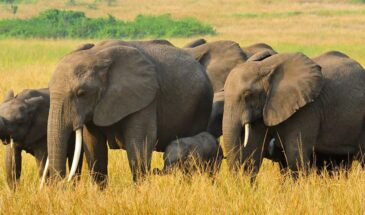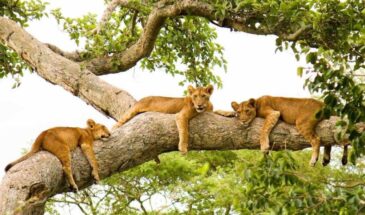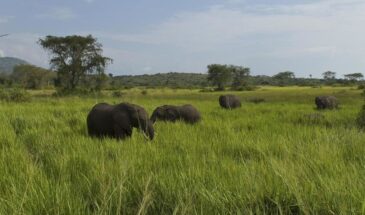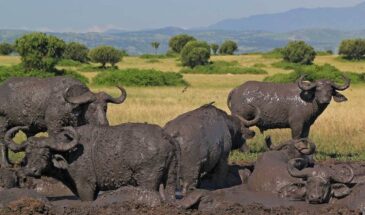- Overview
- Trip Outline
- Trip Includes
- Trip Excludes
- Gallery
- Booking
- FAQ
Queen Elizabeth National Park Safari
Description
Under 400km from Uganda’s capital and largest city, Kampala, Queen Elizabeth National Park’s boundaries protect a plethora of wildlife sure to make every safari-goer’s dreams come true. The lakeshore is dotted with pink-backed pelicans and wallowing hippos, while elephants and leopards wander along the forest grassland. The park’s Ishasha plains see unaware Ugandan kob grazing near fig trees in which tree-climbing lions wait ready to pounce.
Game drives and scenic nature walks are the order of the day, while boat cruises along Lake Edward will bring eager visitors even closer to the park’s thirsty and water-dwelling inhabitants. Queen Elizabeth’s volcanic terrain is a photographer’s delight, while birders won’t know where to look. Visitors can reach the park by road from Kampala or by flying to Kasese Airport or the park’s airstrip.
There are hundreds and hundreds (over 600) bird species, some rare, others endemic and many odd, including the pouting shoebill which stands at a huge 4ft tall. In Kyamburu Gorge you will find, among the hanging vines and dense treetops, social chimpanzees and in Ishasha, the famous tree-climbing lions, sultry leopards and migratory elephants which cross over from the DRC. Flamingos loiter round the crater lakes in the north, and you will find what is said to be the largest concentration of hippos lounging in the Kazinga channel. Other wildlife you may encounter includes warthog, giant forest hog, rare aquatic sitatunga and waterbuck
Chimpanzee Tracking
Kyambura gorge provides spectacular scenery for chimpanzee tracking in Queen Elizabeth National Park. There are several chimps habituated in this gorge. Chimps stay in groups (called troops) of about 30-80 members. Chimps usually chew on leaves and use them like a sponge to dip in water and suck out the moisture. They also use twigs to pick into termite holes and enjoy nuts, fruits, seeds, and flowers. Their vegetarian diet is usually supplemented by meat, like young antelopes or goats.
Observers have sometimes spotted the chimpanzee killing smaller primates like young baboons, blue monkeys, and Colombus monkeys and feast on the carcasses. There isn’t any particular breeding season, and the females give birth every four-five years. They are quadrupedal, walking fast on their four limbs. They are swift climbers, setting their nest high in trees.
Chimpanzees are, by nature, a lot more aggressive, but conservation authorities have habituated the groups you’re permitted to visit. Aggression towards humans in that context is extremely rare, but you have to exercise caution when near chimps.
No details found.
Itineraries
Day 1
Arrival in Uganda
You will be met at the airport by our Jimspeco Rep. who will transfer you to the hotel reserved for you in Kampala. Dinner and overnight will be at this hotel.
Day 2
Travel to Queen Elizabeth National Park
You will depart Kampala in the morning after breakfast and travel westwards through Uganda’s beautiful green countryside to the Queen Elizabeth National park. The journey will take 6-7 hours with stopovers at areas of tourist attraction such as the Royal Drum makers’ village and the Equator for an opportunity to stand in two hemispheres at the same time.
You will continue through the savannah grasslands with lots of banana plantations and several herds of local long horned Ankole cattle endemic to this part of the country. You will get to Queen Elizabeth National Park in the evening. Dinner and overnight will be at the lodge reserved for you.
Day 3
Game drive and boat cruise
You will set off early (about 6.30am) for a morning game drive, an awesome experience to spot the animals in natural habitats. Expect to see the famous Big Five; Elephant, Buffalos, Lions, Bush bucks, Kobs, Giant forest hog, Hyenas leopards, antelopes, and Waterbucks as well as birds. You will return for breakfast and relax till lunch.
In the afternoon you will take a launch cruise along the amazing Kazinga channel to see at close range the water animals to include Hippos, Buffalos, and Crocodiles. There is also a variety of bird species on the water banks especially the famous Shoebill, pelican and Jacana. Dinner and overnight will be at your lodge.
Day 4
Primates tracking and nature walks
After breakfast, you can proceed to either Kyambura Gorge for Chimp tracking, visit the bat cave or visit the Blue Lake. You will later drive back to Kampala arriving in the evening. Dinner and overnight will be at your reserved hotel.
Day 5
Travel to Queen Elizabeth National Park
After breakfast, you will leave for Maramagambo Forest – one of Uganda’s exceptional tropical forests to search for chimpanzees and other primates. You will return to your accommodation for Lunch and in the afternoon take a nature walk to visit the bat caves and the fabled Blue Lake. You will return to your lodge for dinner and overnight.
Day 6
Travel to Kampala
After breakfast, you will be taken to Kaaku swamp to look for birds such as the Rufous-bellied Heron, Lesser Jacana, Lesser Moorhen and shoe bill among others. After the birding experience at Kaaku Swamp you will leave for to Kampala for overnight or transfer to the airport for your onward flight.
- Accommodation
- Breakfast, Lunch Dinner
- Park Entrance
- Chimpanzee Trekking Permit
- Arrival & Departure transfers
- Guide Fees and Transportation
- Air fares
- Visas
- Insurance
- Soft or alcoholic drinks
- Porterage or laundry
- Mineral water excluding that offered in the vehicle, any meals, accommodations and tours not included in the itinerary (before and after the tour) tips to local guides and finally items of personal nature.
All safari guests must carry a passport that is valid for six months beyond the intended length of stay. The East African governments require visitors to purchase visas. It is recommended you purchase your visa in advance but you purchase one on arrival at entry points. Check with your consulate for the latest visa and entry requirements.
You are required to purchase a tourist visa before you enter Uganda. Tourist visas can be bought in advance via the embassy or consulate in your country or simply purchased upon arrival at Entebbe International Airport or at any overland border. Photos are not required and a single entry tourist visa costs US$ 100 per person for up to 90 days stay in Uganda.
If you are planning to combine Uganda with a visit to Rwanda or Kenya it is recommendable to request for the East African Tourist Visa instead of a single entry visa. This special visa costs US$175 per person plus service fee and allows a 90-days multiple entry to Uganda, Rwanda and Kenya. Regretfully, Tanzania is not (yet) a member of the East African community and therefore not part of this special visa arrangement
While communications in remote tented camps will be limited, most major hotels and lodges offer Internet services as well as international telephone services. Additionally, private communication centers and cyber cafes in larger towns enable tourists to stay connected. Some centers may close on Sundays and public holidays.
The cellular networks in safari destinations cover most large towns and tourist areas.
Credit cards are accepted in hotels, camps, lodges and major cities and towns, but are not widely accepted elsewhere. Local currency can be drawn against Visa and other major credit cards at selected ATMs in Kampala, at Entebbe International Airport, and in a few other large towns
Banks in Uganda are generally open from 9am to 3pm Monday to Friday, and 9am to 12noon on Saturdays. Some banks are open later.
The official currency is the Uganda shilling. The US dollar is traditionally the hard currency of preference, but euro and pound sterling are also widely accepted. Most hotels and camps accept Credit/Debit cards. US dollar notes that are older than year 2000 are not accepted everywhere and can be very difficult to exchange. Major currencies such as the dollar and the euro are easily exchanged at the airport, banks and private bureau de change in all large towns, but traveler's checks are not widely accepted outside Kampala.
Basic precautions should be taken in all countries. Tour guides are highly experienced in navigating each destination, but visitors should always be aware of their surroundings, especially in any rural villages that may be wary of foreigners. In less-developed countries where many people live in poverty, crimes of opportunity can occur, such as petty theft. Visitors are advised to stay alert and use common sense. Safari guests should limit the amount of cash they carry and lock valuables in a hotel safe or other secure place. Lock hotel rooms when you leave. Do not walk alone in deserted areas at night. Take extra care of purses, bags and wallets in crowded places such as malls and nightclubs.
The drier months from June to August and December to February are the best time for wildlife watching trips to Uganda. There’s also plentiful sunshine at this time. In the wetter months, there’s the possibility that rain will cut off roads and wash out your primate trekking adventure. Primate walks in the forest are a big part of any safari in Uganda. The habitat of rainforests are, by default, very wet, and one can't avoid rain completely. However, after heavy rain, the skies often open up to bright sunshine.
Uganda is generally a very safe country for travelers. Ugandans are considered among the friendliest and most welcoming people on planet earth. Feel free to meet and talk to Ugandans, as they will be most honored.
Kampala, the capital city of Uganda is known to be one of the safest in Africa, but just like any country you visit, it’s advisable to always be cautious when traveling in any city.
In the National parks and other tourist hotspots, park rangers and the Uganda Tourism Police are working in liaison with other security organs to ensure security of person and property of visitors as well as the Nationals.
Most tailor made safaris are best on choice depending on what the client will have chosen. Uganda has various hotels ranging from Budget to up market luxury accommodation. Budget accommodation consists of simple and basic rooms, Banda or tents, providing double or twin beds and mosquito nets where necessary. In some facilities where private bathrooms aren’t available, public showers and toilets/pit latrines are used. Hot water is not guaranteed. Luxury accommodations are 4 or 5 star lodges, providing comfortable rooms or luxury furnished tents and a private bathroom. Flush toilets as well as hot and cold running water will be available.
It is best to book as far in advance as possible (at least 3-6 months), as some safaris (like gorilla trekking) sell out months ahead of their departure dates. This is especially important for those planning to travel during peak seasons (June to August and December to February) and for those adding extensions to scheduled trips.
Tourists are normally transported in 4WD Toyota Hiace minibuses or Land Cruisers with pop up safari roofs with plenty of leg room and comfort while game viewing. For smaller groups land cruisers can be arranged. For larger groups, coaster buses can also be arranged.
Subject to health/fitness, any one above 15 years can partake in gorilla trekking. However, you can only confirm tracking gorillas only if you have a permit. The permits are issued on first come first serve basis on cash payment. Eight people are allowed per day in each gorilla group to track. In order to be able to buy the gorilla permit you have to provide your ground operator with your full names, nationality and passport number.
Light wear during the travel days; good hiking boots, sun hat, sweat band, long sleeved shirts/blouses & gloves for tracking gorillas & chimpanzee, rain gear, body cream and sun glasses. Most up market lodges have swimming pools, so remember your swim suits! We advise you to also carry a sweater or coat as some places may be cold in the evenings, especially in Bwindi, Mgahinga, Lake Bunyonyi (Kabale).
With Uganda being located within the tropical altitude, it’s advisable you take malaria prevention medications, as well as vaccination against yellow fever which is mandatory. Immunizations against DTP (Diphtheria, Tetanus and Polio) and Hepatitis A are recommended too, and this is required before you enter Uganda. Besides vaccination you are advised to bring insect repellent, for emergency carry a mosquito net in your bag, though there are mosquito nets in most hotels and lodges across the country.






